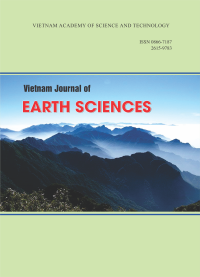Study of the Earth’s crustal structure in the Area of Song Tranh and it’s adjacents
Author affiliations
DOI:
https://doi.org/10.15625/0866-7187/37/2/7368Abstract
Until now, the structures of the earth’s crust in the area of Song Tranh and it’s adjacents are only reflected sketchy in the studies of regional characteristics, mostly in the structural schemes established for whole country. Since the year 2012 in the area of Bac Tra My district, Quang Nam province are appeared a series of earthquakes after an water filling of the hydroelectric power plant reservoir Song Tranh 2. A portion of the events are produced the ground motion of threat level for local peoples. The numbers of houses are subjected to damage. The increase suprisingly of the seismic activity in that area is recongnized as an induced earthquake phenomenon by most of scientists worked in this research direction. Understanding the mechanism of earthquake occurence and earthquake hazard level are important. The different types of data are needed for the research, including a more detail scheme of crustal structures. Since the available data capable for study of the earth’s crust in that region are only the garvity and magnetic amomaly maps of scale 1:500 000 and 1: 200 000 respectively. Since the garvity anomalies are demonstrated a good correlation not only with the regional geotectonic environment obtained in the previous studies but also with the local structural elements, it’s extraction using a more dense network of profiles is expected to generate a more detail scheme of crustal structutes in the region. Thus, 8 profiles with the distance from one to another varried in a range 12 - 16km were designed for the study area resticted by the latitudes 15°N and 16°N. The 2.5D gravity modelling is applied for data interpretation. The initial model for each profile was constructed by using all the available data related to the structures. The calculations were perfomanced by iterative process. The target function indicated an average square deviation between the theoretical and observed gravity data along each profile is calculated for each iteration. To minimize the target function, the least - squares method is used and the model parameters were changed by using both the Marquardt’s algorithm and interpreter - computer interaction. The calculation process terminated when the target function is became small enough and the respective density model is accepted as the reasonable structural cross sections. The target function <1.0 is accepted as a threshold to terminate the iterative calculated process in this study. In fact, it’s values varried from 0.657 to 0.994 are obtained in the calculations for 8 profiles.
Combine all the density models derived from the calculations, the more detail schemes of the Moho, Conrad and Crystaline surfaces were constructed. A series of local structural elements appeared on its are demonstrated as a new information in comparison with the previous regional studies. In addition, the uprising tendency of the Crystaline basement from East to West derived from the previous studies is replaced by the subsidence with the depth reached more than 5km in the area closed to Viet - Lao border.
References
Trịnh Việt Bắc, Đinh Văn Toàn, 1996: Một số kết quả nghiên cứu cấu trúc địa chất sâu lãnh thổ miền Bắc Việt Nam bằng phương pháp giải bài toán ngược trọng lực 2,5 chiều. Nxb. KHKT. Địa chất tài nguyên, V1, 206-215.
Bản đồ Địa chất và khoáng sản Việt Nam tỷ lệ 1: 1.000.000. Cục Địa chất và Khoáng sản Việt Nam xuất bản 2004. Lưu trữ Địa chất.
Bulax E. G., V. A. Pjanisun, M. N. Markova, 1976: Áp dụng phương pháp cực tiểu hoá hàm số để giải bài toán cấu trúc địa chất theo tài liệu trọng lực. Nxb. Nauka Dumka, Kiev 1976 , 218 tr (tiếng Nga).
Lại Hợp Phòng, Trịnh Việt Bắc, Trần Anh Vũ, 2009: Một số kết quả xây dựng mô hình mật độ vỏ Trái Đất miền Bắc Việt Nam bằng bài toán 2,5 chiều trọng lực, kết hợp sử dụng tài liệu địa chấn dò sâu, Tạp chí CKHvTĐ, T.31, (4CĐ), 390-396.
Bùi Công Quế, Nguyễn Kim Lạp, 1992: Cấu trúc sâu vỏ Trái đất và tính địa chấn lãnh thổ Việt Nam. Xuất bản Viện Khoa học Việt Nam, 148tr.
Đinh Văn Toàn, Steven Harder, Trịnh Việt Bắc, Lại Hợp Phòng, Đoàn Văn Tuyến, Trần Anh Vũ, Nguyễn Thị Hồng Quang, 2010: Cấu trúc sâu vỏ Quả đất Miền Bắc Việt Nam trên cơ sở sử dụng kết hợp tài liệu địa chấn dò sâu và trọng lực. Tuyển tập HNKH 35 năm Viện KH&CNVN 1975-2010, Nxb. Khoa học Tự nhiên và Công nghệ, Quyển Khoa học Trái đất, 167-171.
Phan Cu Tien (Editor in Chief ), 1991: Geology of Cambodia, Laos and Vietnam. Published by the Geological Survey of Vietnam, Hanoi - 1991,157pp.
Cao Đình Triều, 1995: New results about structure of the Earth’s crust in Vietnam. J. of Geology, Series B, No. 5-6, 331-339.
Manik Talwani, J. Lamar Worzel, and Mark Landisman, 1959: Rapid gravity computations for two-dimensional bodies with application to the Mendocino sunmarine fracture zone. J. of Geophysical Research, V. 64, No 1, 49-59.
William H. Press et.all, 1990: Nummerical Recipes. Cambridge University Press, 523-528.
I.J. Won and Michael Bevis, 1987: Computing the gravitational and magnetic anomalies due to polygon: algorithms and Fortran subroutines. J. of Geophysics, V.52, No.2, 232-238.
Nguyễn Đình Xuyên, 2009. Động đất lãnh thổ Việt Nam. Tuyển tập kỷ niệm 10 năm hợp tác nghiên cứu khoa học địa chất Việt Nam - Ba Lan: “Địa động lực Kainozoi Miền Bắc Việt nam”. Nxb. Khoa học Tự nhiên và Công nghệ, 165-177.






